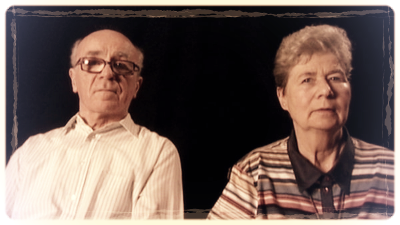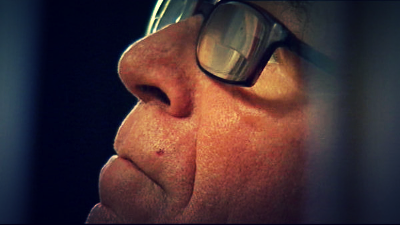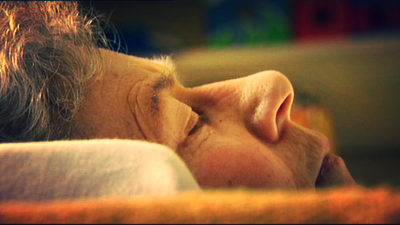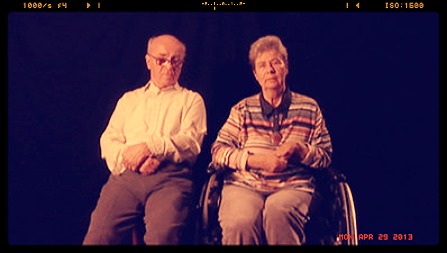Meine Eltern - My Parents
Ein Film von Benedikt Fischer
My Parents

>>> My Parents <<<
by Benedikt Fischer
Father (78) is suffering from dementia, mother (72) is in a wheelchair.
These are the parents of Benedikt Fischer, the director of this film.
Both have lost those capacities which used to be their strengths. The formerly agile mother can only use one leg and one arm, the highly intellectual father can now only laugh or cry.
Is this what role models look like?
In early life parents are naturally the first role models, their influence can last a whole lifetime. But do role models have to be perfect?
And when do you start questioning them?
The author sets out for a biographical journey through time with his parents to find out. A film about growing up, age and dignity.
Hessischer Rundfunk
Producer: Meinhard Schmidt-Degenhard
First Broadcasting: German Television ARD / Das Erste,
Sunday, 4-26-2009, 5.30 – 6.00 p


********************************************
My Parents
Script by Benedikt Fischer
(c) German Television / ARD 2009
Father, 78, lives in a nursing home.Dementia.
Doesn't know how old he is. Needs help with dressing, washing, the toilet.
Mother, 72. Aneurysm six years ago.
Left side paralyzed. Can't walk, or clap her hands.
Do role models look like this?
(Title)
For me in the beginning was Mom and was Dad.
Godlike creatures, pillars my little big world rested on.
(OFF:”And when he looked in his pocket in the morning he found big golden coins inside...”)
YES means YES, NO means NO, we were told.
And all was good.
(OFF: “Very nice singing, my dear darling!”)
Later, the shock. Parents aren't always right.
Later still, the conviction. Parents are never right.
Contempt for their strictness, their helplessness towards me.
Then the insight. Parents are humans too.
But role models?
Mother:
“You were always trying to get by, to see what you can get away with. You cut corners.
And sometimes I had to defend you to Hans. I said to him, he needs this, to make it in life.
You've always found ways to get whatever you wanted.
And they weren't always quite legal. Like when you brought me flowerswhen you came
home dirty, because you'd been playing football again. So I wouldn't get angry.
You had them behind your back, then held them up. You'd stolen them from a garden
somewhere. You grabbed them through the fence. So what, they were just standing there.
I always had the feeling, you'll make sure you'll be alright.
That was important to you.”
My father.
A quiet thinker. Did everything for a reason. Very religous, worked for
the church. Catholic, but critical.
You can come to me any time, he said. But he didn’t really listen.
My opinion hardly counted. Pleasure and fun were no arguments to him.
It was hard for him just to say yes. It was always yes, but...
He once changed my A to a B plus.The teacher had missed a mistake.
Now you may really be proud, he said. A matter of honesty.
You can't be trusted, he said, when I was late or didn't clean up my room.
To be reliable in life was important to him.
I was hurt by it.
Role model?
Father (letter):
“Dear son, I want to tell you something you only tell anyone once in life. You say
we don't understand you. I keep noticing you act impulsively. You don't act sensibly,
your actions aren't rationally controlled.Your character is playing dangerous tricks on you.
But we can't realize everything that currently seems desirable to us. Find a compromise
between dream and reality. You're nineteen now.That would be maturity.
Your negative and dangerous traits...I'll spare us both a list...aren't compensated
by the positive ones. They never will be, for no human being. They will be accepted
only because of the good qualities. As your dark side.”
My mother.
She listened, but briefly. Always on the go, to control things. Especially
her children. She always knew how things or people should be.
One look at my friends was enough to tell if they were no good.
Impatient. Controlling instead of trusting. She left little leeway.
Always worried about what people might think. Her NO meant NO, oh yes!
And I felt smaller than I was.
Role model?
Mother:
“That's true. I realized that much too late. Children are allowed to decide much earlier
nowadays. I wasn't able to do that myself. I didn't really notice it. Today, when I think
about certain things, I wonder...why didn't I let go?
Why didn't I let you have your say? I'd never learned how. It didn't occur to me.
I felt I was responsible for decidingthese things for you as well.
Crazy, isn't it?”
“I promised myself I wouldn't hit my children. But I did it anyway. As my mother got older,
she became softer. Simply sweet. Before, though, she'd been a very strict person.
But it was hard for her, with six children, in difficult times. Having to flee, being bombed out,
it wasn't easy. She was afraid we'd leave the straight and narrow. So there were
very many smacks. I don't like to call them blows, because that sounds like taking it out
on us. But she actually hit us because she felt she had to, to get us back in line.”
A strong mother, five older siblings. It was the same for my father.
He was nine when Second World War began, my mother three.
My grandparents had to survive. Children should obey, without debate.
Sometimes your hand slips, as they said then.
Different times, but they have an effect.
Mother:
“I remember, at a certain age I had trouble with arithmetic. I didn't understand it anymore.
And once I got a failing grade. My mother hit me with a kitchen spoon.
But I didn't blame her afterwards. It just went away.
When I had children myself, I realized how hard it is to bring children up the way
you'd planned to. It's really terrible. You don't want to repeat what happened to you
but it just slips out, and you react the wrong way. I was convinced I didn't want to hit them.
But it happened anyway.
And I was always sorry afterwards.”
I wished my father was also a big buddy to me. Not just a judge, a teacher,
a philosopher.
Someone who showed me what joy is, and life. Not just survival.
A father who believed in me doing my best. Who didn't always doubt me,
or himself. Who said yes, not yes, but...
Not a different father, just more of a father to me.
Father (letter):
“I'm often very sad that it seems to be so hard for me to be a father. If I was often strict
and impatient, I justified this to myself by thinking you'd understand one day.
I've thought about my own childhood a lot. I tried to avoid my parents' mistakes.
And secretly, I comforted myself in my discontent by thinking of later. Later, when I could
talk to you sensibly, I could help you a lot, I thought. But other people have shown you
the way.
And I wish the last trace of bitterness about this will leave me. I didn't want to be idolized.
But is it that strange I wanted to be a normal father, at least? A father you ask for advice,
because he's always willing to understand you, to help you, to encourage you?
Well, you can't force someone to trust you like that. The fact remains that, when it mattered,
I didn't seem approachable to you.
That I've failed as a father.”
I wished my mother was softer, not so sharp in her judgements.
That she wouldn't take so long to give in. Not so distrustful, but simply kind,
without reason, without moaning.
That she would trust me and my dreams, even if I wasn't grown-up yet.
Not a different mother, just more of a mother to me.
Mother:
“I remember you went to one of those concerts at one time. But you were supposed to go
to the countryside with your friend and his parents to their holiday home. You secretly went
to the concert, and somehow it came out.
Boy, did I make a scene about it. You came up the stairs, beaming, and I let you have it
right away. What have you done? You've been lying to us, and so on.
Afterwards I thought: My God!
Your face just fell. I'd destroyed all your pleasure.
I'm still sorry that I couldn't restrain myself at the time.”
All old stories, pleasant or less pleasant, long since faded.
But what remains?
For instance, that he always had answers to my questions.
He taught me what justice is...and covered my ears in thunderstorms,
so I wouldn't be scared.
(OFF:
”I’m so tired from marching,
from marching. But I’ve lost my...”)
It was important to him that I can master life.
She took me in her arms
when I was sad.
She bore with me when I was
unbearable, and laughed with me.
(OFF:
“Do You understand me?
- Yep. It’s hot, wait a little bit!
-Mummy
- Oh, Yes. Come on, eat!”)
It was important to her that I am fine.
Father (letter):
“It will always hurt me that you think we, your father and mother resent everything you do.
I'm also aware that it's your recklessness and irrationality that I admire so much,
trembling inside.
While it also makes me so sad and frustrated. I've had very many happy experiences
with you. They help me to not become bitter.
When I wake up, thinking your little hand is holding mine, cautiously...the memory becomes
reality. That's more valuable than vows and promises. Who has memories like this?
I still have the small mirror you once gave me. You badly wanted to please me,
but didn't know how.I'll never forget them, all these small but important signs of your affection.
Yours, your father.”
They did their best - and I...fought for my desires, as a child often in vain.
Alone against a wall of two, that's what I thought. When it crumbled, it was
too late. At 15, I stopped waiting. Did what I wanted without their blessing.
I had expected much more. Like him.
I was impatient, harsh. Like her.
Mother:
“You pass on many of your traits. You tried to restrain them in your own character
...then you see them appear in your children.
That's why you act more strictly than necessary, perhaps.”
His reserve, constant discontent, her stubbornness and harsh judgements...
I see them in myself. Unfortunately.
Then again, seeking justice, never giving up, acting instead of talking...
that I also got from them. Fortunately.
We are alike.
My father, my mother, are a part of me.
But role models?
Alright. In the beginning always was Mom and was Dad. But in the end?
What about today, now that they're old, disabled, and need help?
The old father is gone.
The protector, the eloquent know-it-all. As well as the priggish, self-righteous,
explosive one.
Strange. Now, he is my friend.
The old mother is also gone.
The one who handled things quickly. And also the stubborn, harsh one
who could act too quickly. Today, she is softer.
A long road, not a beautiful one.
Mother:
“Everything was about him. I always made sure he was fine, taken care of.
At last I had someone I could discuss anything with. He did his best to answer
all my questions. And I miss that.
We did everything together. Feeding you, bathing you, putting you to bed.
One evening, Hans was still sitting at the table. I sat down on his lap and leaned against him.
That was all. He put his arm around me. And I had such a feeling of peace,
of security. That's how I imagine death. No more desires, everything's taken care of.
I thought, it could be like this forever.
I have so many happy memories of him, of you. I'll never forget them.
But it's no longer like that.”
Multi-hemorrhagic dementia. Small strokes paralyzing the mind.
Everything disappears. Each day my father loses a part of his life.
Mother:
“I didn't know why it all changed. We were always able to talk. Nothing mattered to him
anymore. We couldn't discuss things anymore. So I wrote him letters. Interestingly,
he kept them all. We found them in his desk. I never got an answer. I saw it
as a lack of interest. I was angry at him, I was hurt.
Now I know that he couldn't respond. I didn't know it then.
He's no longer the man I got to know and love.
Now he's a loveable man who needs help, care, looking after.
And I can't provide much of it, I have my own problems to deal with.
I have just enough strength left to get through the day.”
What does the quick one do when she's no longer quick?
She fights the pain, the growing paralysis, the slow dying.
And tries to use her remaining strength well, find new strength, a new tempo.
Alone.
All this means something to her life. The stroke as well, six years ago,
especially the hard time after it.
Mother:
“I have to learn something from it. That I'm important as well. I have to take care of myself too.
I'm not afraid of death.
The older I get, the more I distance myself from the church as an institution.
Faith is important to me. I don't feel abandoned even now. I feel supported, escorted
and protected. That gives me the feeling that nothing can really happen to me.
That's important. That's what faith means to me.
I won't be talked into anything anymore.”
She remains true to herself. Always on the move.
But differently, this time.
You're alive only if you move. So she never gives up. She wants to do it alone.
She doesn't complain.
(Mother:
“There's no reason.”)
Role model.
And what’s about the thinker who can't think anymore?
Tired, as he always swam against the tide.
He explained the world to me, but not his own.
Feelings were unreliable, but the mind was reliable. Faith as well.
The reliable is gone, it's crumbling away day by day.
But the eternal doubts are gone as well. What would he say if he could?
Or has he said and thought enough?
His life has become easier somehow. Richer even, in a sense.
Because what remains are feelings.
He's afraid, he says. At last!
In the past this remained unsaid. Sadness was not cried over, but many
small joys also remained unnoticed.
Now, it’s all there.
Facing this takes courage. And the humility to accept what can't be helped.
Role model.
”Honor thy father and mother” is one of the Ten Commandments.
But why honor them? Because I want to know who I am, where I come from.
Honor them. Be honest, even if it hurts.
Critical, but merciful. To them and to myself.
Looking more closely. Learning to understand it all a little better.
Mother:
“Trying to understand their mistakes and weaknesses. They're part of being human.”
Father:
“That's just the way it is. It's human...imperfection.”
Mother:
“If you've also received love from your parents, it balances out. To a certain degree.
When children feel that your mistakes weren't directed at them...but the result of your
own weakness.
If you can give that a place, then it's okay.”
These are my parents.
You are my father.
You are my mother.
And I am I.
But that’s another story.
(credits)
(OFF:
“Do you have any role models?”)
Father:
“I'm not going to tell you.”
******************************************************************************
Writer, Narrator, Director: Benedikt Fischer
Camera: Peter Hoffmann, Oliver Klös
Sound: Ralph Ganswindt, Simone Jung, Sascha Mattlehner
Editing: Constanze Reinken, Joachim Wölcken
Sound mixing: Reinhard Sanojca
Production management: Matthias Roth, Katrin Klöntrup
Creative consultant: Ulrike Zapf
Producers: Ilyas Meç, Meinhard Schmidt-Degenhard
© hr / ARD 2009

Verantwortlich für den Inhalt dieser Seite ist ausschließlich der
Autor dieser Homepage, kontaktierbar über dieses Formular!